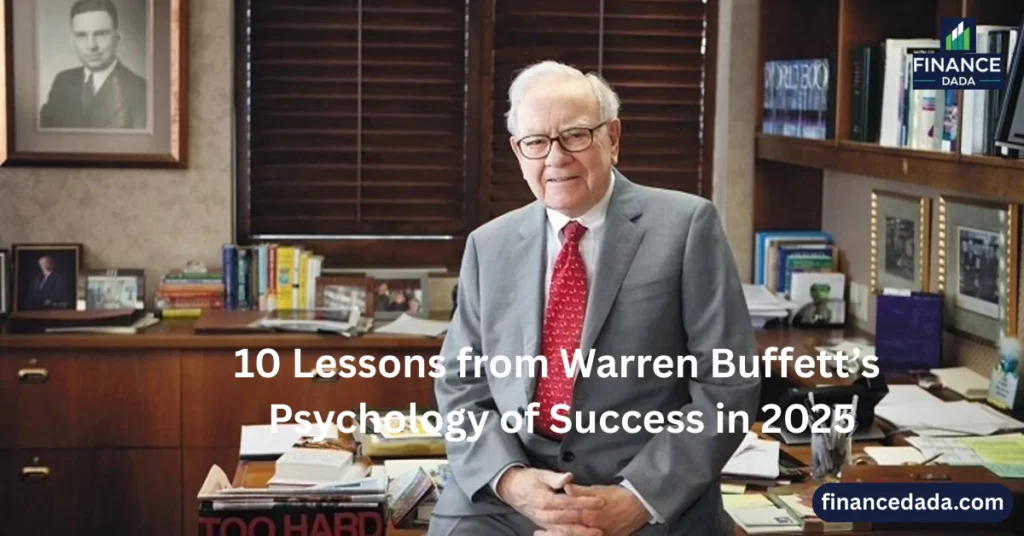10 Lessons from Warren Buffett’s Psychology of Success in 2025
10 Lessons from Warren Buffett’s Psychology of Success in 2025: Warren Buffett, the Oracle of Omaha, is one of the world’s most successful investors, with a net worth of ~$143 billion as of July 2025. Leading Berkshire Hathaway, he has consistently outperformed the S&P 500, achieving a ~20% annualized return over decades. His success stems not only from financial acumen but also from a disciplined mindset and psychological principles that guide his decisions.
This article explores 10 key lessons from Buffett’s psychology of success, drawn from his quotes, letters, and actions. These lessons offer actionable insights for investors and anyone seeking long-term success in 2025.

Why Study Warren Buffett’s Psychology?
Buffett’s approach to investing transcends numbers, rooted in mental discipline, patience, and emotional resilience. His psychological framework helps navigate the volatile stock market, where India’s Nifty 50 has delivered ~12% annual returns over the past decade. By mastering these principles, you can make better financial decisions, avoid common pitfalls, and build lasting wealth. These lessons are timeless, applicable to both novice and seasoned investors.
10 Lessons from Warren Buffett’s Psychology of Success
Based solely on the reference article, here are the 10 lessons from Buffett’s mindset, with practical applications for 2025:
1. Focus on What You Can Control
- Buffett’s Insight: “You can’t control the market, but you can control your reactions and decisions.”
- Explanation: Buffett emphasizes managing your behavior over reacting to market fluctuations. He avoids speculative trends, focusing on research and discipline.
- Application: In 2025, with market volatility driven by global uncertainties, prioritize research over chasing short-term gains. Use platforms like Moneycontrol to analyze fundamentals.
2. Stay Within Your Circle of Competence
- Buffett’s Insight: “Know what you’re good at and stick to it.”
- Explanation: Buffett invests only in businesses he understands, like Coca-Cola or Apple, avoiding unfamiliar sectors like tech startups.
- Application: Identify your strengths (e.g., analyzing PSU stocks) and avoid speculative bets on unproven sectors like AI-driven crypto in 2025.
3. Patience Is a Superpower
- Buffett’s Insight: “The stock market is a device for transferring money from the impatient to the patient.”
- Explanation: Buffett holds investments for decades, letting compounding work its magic, as seen in his long-term stakes in American Express.
- Application: Adopt a long-term perspective, holding quality stocks like Reliance Industries for 5–10 years to benefit from India’s growth.
4. Embrace Simplicity
- Buffett’s Insight: “Complexity is the enemy of execution.”
- Explanation: Buffett prefers simple businesses with clear value propositions, avoiding overly complex models.
- Application: In 2025, focus on straightforward investments like blue-chip stocks on NSE, using platforms like Zerodha for easy execution.
5. Think Long-Term
- Buffett’s Insight: “If you aren’t willing to own a stock for 10 years, don’t even think about owning it for 10 minutes.”
- Explanation: Buffett evaluates companies based on their long-term potential, not short-term price swings.
- Application: Build a portfolio with stable companies like HDFC Bank, aligning with India’s projected 7% GDP growth through 2030.
6. Ignore Market Noise
- Buffett’s Insight: “Don’t let the daily ups and downs distract you from your goals.”
- Explanation: Buffett avoids reacting to market rumors or short-term volatility, focusing on intrinsic value.
- Application: In 2025, filter out social media hype on X and focus on fundamentals using Economic Times.
7. Learn from Mistakes
- Buffett’s Insight: “Mistakes are inevitable; the key is to learn from them quickly.”
- Explanation: Buffett admits to errors, like his investment in Tesco, and uses them to refine his strategy.
- Application: Reflect on past investment losses, such as overpaying for penny stocks, and adjust your approach using tools like TradingView.
8. Cultivate Emotional Discipline
- Buffett’s Insight: “Be fearful when others are greedy, and greedy when others are fearful.”
- Explanation: Buffett buys during market downturns and avoids euphoria-driven bubbles, maintaining emotional control.
- Application: In 2025, buy undervalued stocks during corrections (e.g., post-election volatility) and avoid chasing overvalued tech stocks.
9. Value Quality Over Price
- Buffett’s Insight: “It’s far better to buy a wonderful company at a fair price than a fair company at a wonderful price.”
- Explanation: Buffett prioritizes businesses with strong moats, like Geico, over cheap but mediocre firms.
- Application: Invest in quality Indian companies like TCS with strong fundamentals, even at a premium, for long-term gains.
10. Continuous Learning
- Buffett’s Insight: “The more you learn, the more you earn.”
- Explanation: Buffett spends hours daily reading reports and staying informed, enhancing his decision-making.
- Application: Dedicate time to studying market trends in 2025, using resources like Screener.in to analyze financials.
Buffett’s Lessons Summary Table
| Lesson | Key Quote | Application in 2025 |
|---|---|---|
| Focus on What You Can Control | “You can’t control the market, but you can control your reactions.” | Use Moneycontrol for research, avoid impulsive trades. |
| Stay Within Your Circle of Competence | “Know what you’re good at and stick to it.” | Focus on familiar sectors like Indian PSUs. |
| Patience Is a Superpower | “The stock market transfers money from the impatient to the patient.” | Hold quality stocks like Reliance for 5–10 years. |
| Embrace Simplicity | “Complexity is the enemy of execution.” | Invest in blue-chip stocks via Zerodha. |
| Think Long-Term | “Own a stock for 10 years or not at all.” | Build a portfolio with HDFC Bank for long-term growth. |
| Ignore Market Noise | “Don’t let daily ups and downs distract you.” | Filter X hype, focus on Economic Times data. |
| Learn from Mistakes | “Mistakes are inevitable; learn from them quickly.” | Analyze losses using TradingView to refine strategy. |
| Cultivate Emotional Discipline | “Be fearful when others are greedy.” | Buy during corrections, avoid overvalued stocks. |
| Value Quality Over Price | “Buy a wonderful company at a fair price.” | Invest in TCS for strong fundamentals. |
| Continuous Learning | “The more you learn, the more you earn.” | Study financials on Screener.in daily. |
Why Apply Buffett’s Psychology in 2025?
Buffett’s principles are particularly relevant in 2025, given global economic uncertainties and India’s dynamic market. Key reasons include:
- Market Volatility: Geopolitical tensions and inflation may cause fluctuations, making emotional discipline critical.
- India’s Growth: With a projected 7% GDP growth, long-term investments in quality stocks align with Buffett’s approach.
- Retail Investor Surge: Over 10 crore Demat accounts in India (CDSL, 2025) highlight the need for disciplined investing.
- Behavioral Edge: Avoiding market noise and focusing on fundamentals can yield superior returns.
How to Implement Buffett’s Lessons
To apply these lessons effectively in 2025:
- Research Thoroughly: Use Screener.in to analyze company financials, focusing on metrics like P/E and ROE.
- Stay Disciplined: Set clear investment goals and avoid impulsive trades during market corrections.
- Focus on Quality: Invest in companies with strong moats, like Asian Paints, with consistent revenue growth.
- Track Progress: Use TradingView to monitor technical patterns and confirm fundamental analysis.
- Join Communities: Engage with Indian investment groups on X for insights, but filter noise.
- Consult Advisors: Seek professional guidance for portfolio diversification.
Additional Insights from Buffett’s Approach
Fundamental Analysis
- Buffett’s Method: Prioritizes companies with strong cash flows, low debt, and competitive advantages.
- Application: Evaluate Indian stocks like Infosys for high ROE (~30%) and low debt-to-equity ratios (<0.2).
Behavioral Finance
- Buffett’s Edge: Avoids herd mentality, buying during fear-driven sell-offs.
- Application: Capitalize on 2025 market dips, such as post-budget corrections, to buy undervalued stocks.
Long-Term Mindset
- Buffett’s Strategy: Holds stocks for decades, benefiting from compounding.
- Application: Invest in India’s infrastructure boom via stocks like Larsen & Toubro for 10+ years.
Warren Buffett’s Psychology FAQ
Q1: What is the core of Warren Buffett’s psychology of success?
A: Discipline, patience, and focusing on long-term value over short-term market noise.
Q2: How does Buffett stay within his circle of competence?
A: He invests only in businesses he understands, like consumer goods, avoiding unfamiliar sectors.
Q3: Why does Buffett emphasize patience?
A: Patience allows compounding to work, transferring wealth from impulsive to disciplined investors.
Q4: How can I apply Buffett’s lessons in 2025?
A: Focus on quality Indian stocks like TCS, stay disciplined, and use platforms like Zerodha for execution.
Q5: What does Buffett mean by ignoring market noise?
A: Avoid reacting to daily price swings or social media hype, focusing on intrinsic value.
Q6: How does Buffett learn from mistakes?
A: He analyzes errors (e.g., Tesco investment) to refine his strategy, emphasizing quick learning.
Q7: Why is continuous learning key to Buffett’s success?
A: Daily reading of financial reports enhances his decision-making, a habit investors can emulate using Screener.in.
Conclusion
Warren Buffett’s psychology of success offers timeless lessons for navigating the stock market in 2025. By focusing on what you can control, staying within your competence, embracing patience, and valuing quality, you can build wealth like the Oracle of Omaha. In India’s dynamic market, with ~10 crore Demat accounts and 7% GDP growth, these principles are more relevant than ever. Apply Buffett’s mindset using tools like Moneycontrol and TradingView, stay disciplined, and consult a financial advisor to maximize returns.
Disclaimer: Stock market investments carry risks. Past performance does not guarantee future results. Consult a financial advisor before investing.
Also Read: 10 Best Personal Finance Books Of All Time to Master Your Money in 2025,









